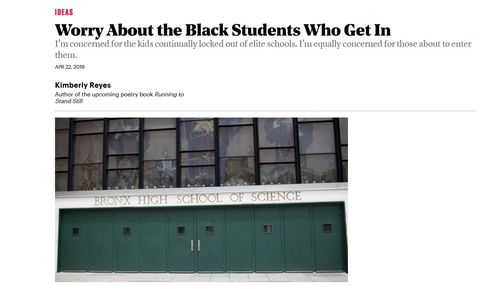
Aggrieved Women: Let’s Talk About Me and My Childhood Classroom Politics Complaints
By Steve Sailer
04/26/2019
From The Atlantic:
Worry About the Black Students Who Get In
I’m concerned for the kids continually locked out of elite schools. I’m equally concerned for those about to enter them.
APR 22, 2019
Kimberly Reyes
Author of the upcoming poetry book Running to Stand StillA few weeks back, when New York City announced the minuscule number of black students admitted to its elite specialized high schools, the report generated the usual dialogues around how the system is broken and what, if anything, can be done to fix it. There is no doubt that the numbers are abysmal: Only 12 black students scored high enough on the citywide test to win a seat at my alma mater, Bronx Science, and just seven to Stuyvesant. While I’m concerned for the black students continually locked out of these spaces, I’m equally concerned for those about to enter them. Remembering my academic career as a black kid in mostly nonblack settings, I’m exhausted for them. …
More than anything, I wanted to fit in, to be like the other kids, except when singularity was deserved, in the form of academic recognition. Neither wish was granted. I was a top performer in my mostly white and Asian elementary school in Queens, coming in first or second on standardized tests most years. Yet at my sixth-grade graduation, I wasn’t acknowledged. I watched my nonblack competitors walk away with about a dozen awards each. Meanwhile, I spent the ceremony crying, confused, and enraged in pink polyester tulle. My favorite teacher tried to calm me down by explaining that I just didn’t have the same “leadership skills” as my peers.
The writing had always been on the wall, or at least in the comments section of my report cards. My kindergarten teacher noted that although I was perhaps her most gifted student, I was too serious and diligent at that age, and didn’t play enough. “Sassy” was written on most of my subsequent report cards. My grades were consistently exceptional, as was my classroom participation, but I was “sassy,” the post-civil-rights equivalent of “uppity.” The mixed feedback was confounding: Speak more, speak up, speak less …
I also remember two instances when white male teachers screamed at me in physically threatening ways that reduced me to tears. Once it was because I spoke too loudly in class. (I guess black voices carry.) The other time, I repeated a joke that an Asian friend had told, something “sassy” but unserious about being too emotional to handle class. When I began to leave — I thought obviously in jest — I was again screamed at, within an inch of my face, and forced to leave, shaking, as my stunned classmates — including my Asian friend — watched.
And so forth and so on.
How much of Wokeness is just an excuse for rehashing ancient personal grievances under the guise of condemning whites or men or, ideally, white men?
